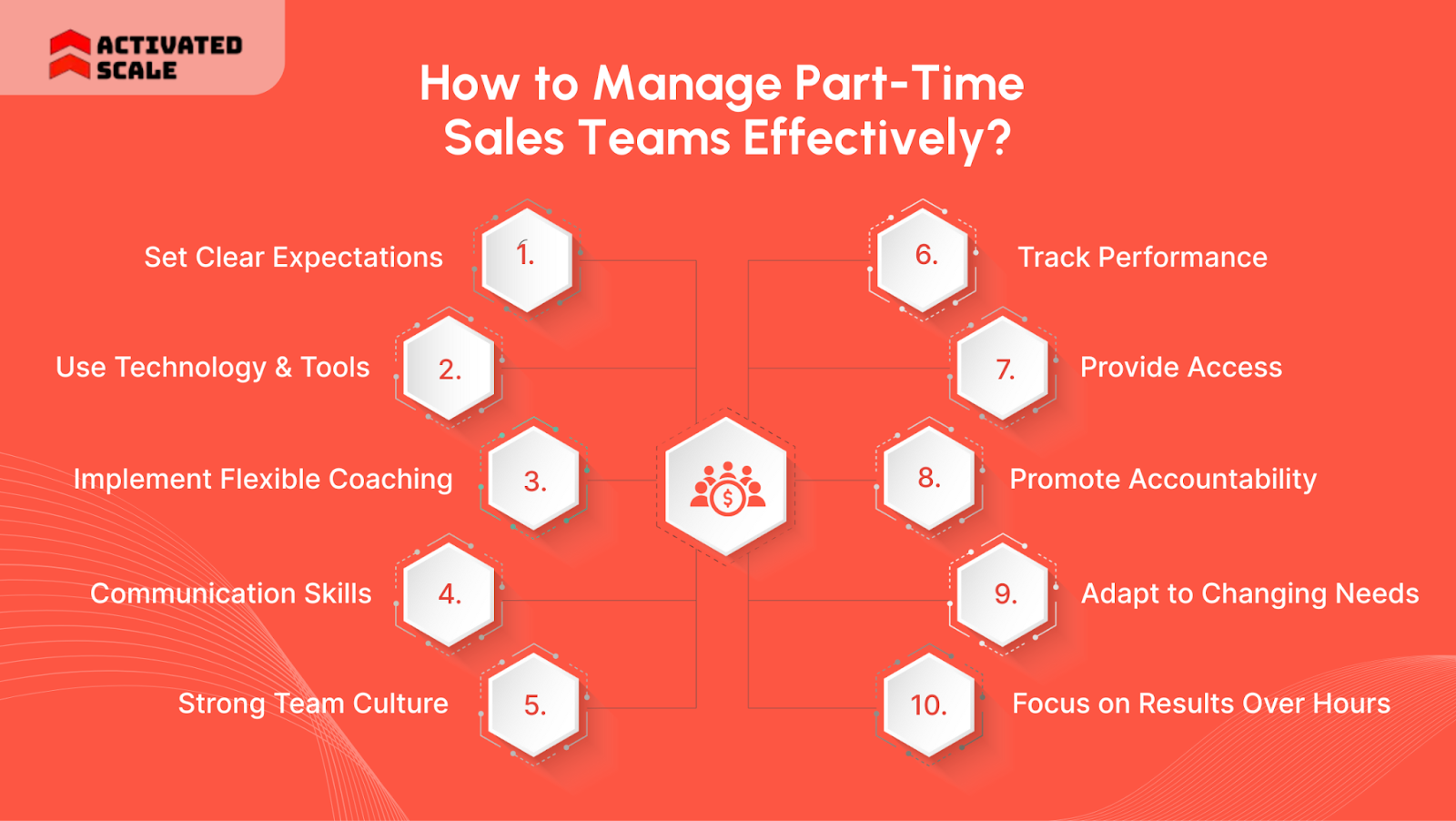In the last few years, companies have shifted toward more flexible work models, and part-time sales teams are now a common solution. But managing them effectively? That's where the real challenge lies.
We know that many sales leaders struggle with getting the same results from part-time teams as they do with full-time employees.
With the right management tactics, you can see increased productivity, improved team cohesion, and a stronger bottom line. For example, team-building activities can reduce turnover by 36%.
In this blog, we’ll walk you through practical strategies to learn how to manage part-time sales teams. It helps you overcome challenges like inconsistent scheduling, alignment issues, and missed targets.
A Quick Snapshot of the Blog
- Properly structured part-time teams achieve measurable growth without increasing overhead.
- Track KPIs and outcomes rather than time spent to reward productivity effectively.
- Centralized tools and recurring updates ensure part-time reps stay aligned and informed.
- Involving part-time team members in culture and meetings increases engagement and retention.
- Fractional or contract-to-hire models let businesses test expertise before full-time commitments.
What are Part-Time Sales Teams?
Are you still viewing part-time sales teams as a temporary solution or a last resort? You may need to think again.
If your business is scaling or needs flexibility in its sales structure, understanding how to integrate part-time team members is crucial. This will help you stay ahead of the competition.
So, what exactly are part-time sales teams? These are professionals working on a part-time or fractional basis, offering businesses a chance to stay lean while still hitting their targets.
Unlike full-time teams, part-time salespeople often bring niche skills or industry expertise that may be costly for a full-time hire. In this way, businesses like yours can turn to part-time sales teams for many specific roles.
Do these businesses get the benefits they expect? You can find that out in the next section.
Read Also: Beyond Part-Time: Why Fractional Work Might Be Perfect for You
Benefits of Managing Part-Time Sales Teams

You have done the hard work while hiring part-time sales teams. Now, managing part-time sales teams can feel overwhelming while keeping your costs in check.
If you’re still not sure whether part-time is the right choice, these advantages might just change your mind:
- Cost Efficiency: Part-time sales teams cut down on overhead costs. No need to worry about benefits, full-time salaries, or long-term commitments. You can scale up and down as needed.
- Flexibility: Part-time salespeople give you the flexibility to adjust quickly. They can work on a special project or ramp up sales efforts during peak seasons.
- Access to Specialized Talent: Hire experts in specific areas of sales, like B2B or SaaS, without committing to a full-time role. Tap into skill sets your business might not afford otherwise.
- Improved Work-Life Balance: Flexible schedules help attract top talent who want to work part-time. It brings more experienced professionals into your sales pipeline.
- Enhanced Focus: Part-time workers can bring a sharper focus during their working hours, increasing overall productivity.
Explore how Activated Scale’s Fractional Sales Leadership services can help you find the right part-time talent.
Now that you know why part-time sales teams can be useful, it’s time to learn how to manage them effectively. Without the right strategy, those benefits can quickly fade.
How to Manage Part-Time Sales Teams Effectively?

As part-time sales teams become more common in 2025, understanding the right metrics to track is critical to ensure alignment. Without tracking these, you risk missing out on growth opportunities or misaligning efforts.
Don’t think these strategies will be pretty much similar to what you do for your full-time team. Here are the 10 key metrics you can’t afford to overlook for a part-time sales team:
- Set Clear Expectations
Clarity is the foundation of productivity. Part-time salespeople felt confused about their goals when management expectations weren’t clearly defined. 80% of employees feel dissatisfaction with managers, and clear expectations can reduce the numbers.
What to do:
- Define roles, responsibilities, and KPIs customized to part-time schedules.
- Align quotas with realistic hours and availability.
- Ensure team members understand how their work impacts business objectives.
Action Steps:
- Host a kickoff meeting to outline specific targets and deadlines.
- Create a shared goals dashboard using a simple tool like Asana or Monday.com.
- Assign a mentor or point-of-contact for each part-time salesperson to answer role-specific questions.
- Use Technology and Tools
The right tools can elevate your part-time team’s performance. Using CRM systems and automation saves time and ensures that your team is always in sync and focused.
What to do:
- Use CRM software to track leads, performance, and interactions.
- Give easy access to sales collateral, playbooks, and dashboards.
- Automate repetitive tasks such as follow-up emails and data entry.
Action Steps:
- Set up automated alerts for priority leads and follow-ups.
- Share a centralized resource library for all team members.
- Integrate communication tools like Slack or Teams for instant updates.
- Implement Flexible Coaching and Development
Part-time salespeople need targeted support without constant micromanagement. Quality coaching increases sales reps' job satisfaction by 19%.
What to do:
- Schedule regular one-on-one sessions to address skill gaps.
- Encourage self-directed learning with online courses or microtraining.
- Provide feedback focused on improvement and growth rather than hours worked.
Action Steps:
- Create personalized development plans highlighting strengths and improvement areas.
- Offer optional live workshops on high-value skills like objection handling or account mapping.
Need a flexible coaching plan for your part-time sales team? Fractional Selling service from Activated Scale can help you hire reps who can design personalized development programs.
- Promote Strong Communication Skills
Communication is key to keeping part-time teams aligned with the company’s goals. Regular check-ins and using the right communication tools prevent gaps in understanding and productivity.
What to do:
- Build open communication with full-time employees.
- Use collaboration tools to share updates, questions, and insights.
Action Steps:
- Set fixed weekly team calls with a clear agenda.
- Encourage a “no question is too small” approach via chat channels.
- Rotate a communication champion among part-time team members to keep messages consistent.
- Create a Strong Team Culture
A strong culture helps retention, engagement, and motivation. 83% of employees do quality work if they have a positive work culture.
What to do:
- Recognize achievements publicly, regardless of hours worked.
- Include part-time team members in celebrations, contests, or milestone recognition.
- Organize virtual or occasional in-person team-building activities.
Action Steps:
- Launch a monthly “highlight reel” celebrating wins.
- Schedule quarterly team events, both in-person and online.
- Encourage mentorship connections between part-time and full-time staff.
- Track Performance and Provide Feedback
A strong team culture binds part-time salespeople to your larger goals. Recognizing achievements promotes a sense of morale.
What to do:
- Evaluate performance regularly against defined goals.
- Provide data-driven, constructive feedback to improve skills.
- Adjust strategies based on individual and team performance.
Action Steps:
- Set up weekly KPI dashboards in your CRM for easy visibility.
- Conduct short performance review sessions to highlight successes and gaps.
- Develop a recognition system tied to measurable outcomes.
- Provide Access to Resources
Part-time salespeople can’t perform if they lack tools. Research in 2025 shows 55% of reps lack the right AI tools and resources.
Resources are a must for part-time teams to succeed. Offering seamless access to tools, training, and materials ensures they can hit the ground running from day one.
What to do:
- Provide a clear onboarding process to get new team members up to speed quickly.
- Equip part-time staff with resources to work independently.
Action Steps:
- Maintain a centralized digital library of resources and scripts.
- Assign a “resource buddy” to new hires for guidance.
- Schedule short, focused training sessions for critical tools.
Need expert guidance for your part-time sales team? Consider hiring from Activated Scale's Contract-to-Hire Sales Recruiting service. Our sales rep can help design customized training programs.
- Promote Accountability
Accountability ensures part-time team members deliver results without micromanagement. Accountability drives productivity, even in a part-time setting.
What to do:
- Set clear expectations for deadlines and deliverables.
- Track individual contributions to team objectives.
- Hold part-time members responsible for their assigned tasks.
Action Steps:
- Use project management tools like Trello and Asana to assign and monitor tasks.
- Schedule short weekly check-ins to review progress.
- Publicly celebrate achievements to reinforce accountability and motivation.
- Adapt to Changing Needs
Sales priorities shift, and part-time teams must flex accordingly. Business needs change quickly, and your part-time team needs to adapt.
Being flexible with roles and scaling efforts up or down ensures continued success, no matter what the market demands.
What to do:
- Adjust team involvement according to business cycles.
- Be open to reassigning roles to match skills and availability.
Action Steps:
- Maintain a rolling schedule of priorities to align team efforts.
- Cross-train team members to handle multiple responsibilities.
- Use real-time reporting to identify gaps and redeploy resources.
- Focus on Results Over Hours
Output matters more than time logged. Focusing on results helps part-time teams remain motivated and aligned with company goals, regardless of time spent.
What to do:
- Set measurable goals tied to revenue or conversions.
- Recognize top performers regardless of hours worked.
- Encourage efficiency and creative approaches to reach targets.
Action Steps:
- Implement scorecards measuring results, not hours.
- Reward part-time employees for exceeding targets with incentives and meaningful rewards.
- Review workflows regularly to eliminate redundant tasks and boost output.
All the right metrics and tools mean little if your part-time sales team runs into hidden operational hurdles. Understanding and addressing these challenges separates high-performing teams from those that struggle.
Read Also: Uncovering the Benefits: Is Hiring a Part-Time Sales Person the Right Move for Your Business?
Overcoming Common Challenges in Managing Part-Time Sales Teams

Part-time sales teams bring flexibility and expertise, but they also face unique issues full-time teams rarely encounter. Scattered schedules and communication gaps can derail performance if left unchecked.
Let’s explore the top challenges and share actionable practices that help part-time sales teams perform at their best.
- Scheduling and Availability: Part-time reps often have overlapping responsibilities or limited hours, making consistent coverage difficult.
Best Practice: Plan schedules weeks in advance and use tools like Calendly or Deputy to manage shifts.
- Team Integration: Part-time reps may feel disconnected from full-time team goals or company culture.
Best Practice: Include them in core team meetings and milestone celebrations.
- Performance Monitoring: Limited working hours make traditional performance tracking less effective.
Best Practice: Shift focus from hours worked to results achieved using KPIs.
- Communication Gaps: Sporadic schedules can cause part-time reps to miss critical updates.
Best Practice: Centralize information using Slack, Teams, or shared dashboards.
Remember that part-time sales teams succeed when flexibility meets focused strategy and measurable outcomes.
Read Also: SMART Sales Development Goals Examples for Team Efficiency
Wrapping Up
Part-time sales teams offer businesses a unique opportunity to scale intelligently without overextending resources. They bring specialized talent and focused execution, but only when managed strategically.
Many companies underestimate the hidden challenges, from scheduling conflicts to performance tracking. Approaching management with clarity and actionable metrics transforms these challenges into growth levers.
The real advantage lies in combining flexible talent with smart processes while learning how to manage part-time sales teams.
Stop guessing how part-time sales can impact growth. Book a demo with Activated Scale today and see how our experts can deliver measurable results for your team.
FAQs
- Can part-time sales teams handle high-volume pipelines?
Yes, with clear priorities, CRM tools, and focused KPIs, part-time reps can deliver results comparable to full-time staff. - How do I keep part-time reps motivated?
Provide recognition, growth opportunities, and flexible performance-based incentives aligned with their hours and contributions. - What’s the best way to integrate part-time reps into full-time teams?
Use structured communication, recurring team meetings, and shared dashboards to maintain alignment and connection. - Are there specific roles that work better part-time?
Yes. SDRs (Sales Development Representatives) and fractional sales leaders excel in goal-driven roles without full-time commitments.
The Ultimate Guide to Hiring a Salesperson!
Get the step-by-step guide to hiring, onboarding, and ensuring success!
_edi.png)




